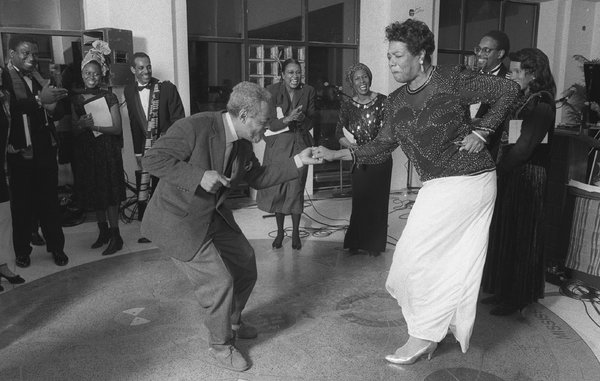Out of her many literary works, perhaps none best sum up the life and times of Dr. Maya Angelou like her following quote:
"You are the sum total of everything you've ever seen, heard, eaten, smelled, been told, forgot – it's all there. Everything influences each of us, and because of that I try to make sure that my experiences are positive."
Born Marguerite Ann Johnson on April 4, 1928, Maya Angelou was the artistic catalyst and idol to the black feminist movement. Holding this purpose with dignity, she carefully balanced it by never downplaying the role and significance of the African-American man.
She changed her name to Maya Angelou, while performing a calypso inspired routine at a San Francisco nightclub in the 1950s. “Maya” is a derivative of “My Sister.” While “Angelou” was derived from her married name Angelos, taken from aspiring musician Tosh Angelos to whom she was married at the time.
Though her writings have since become quintessential examples of African-American literature, she received a fair amount of controversy for her creative works with several of them (most notably I Know Why the Caged Bird Sings) being banned at several public libraries during its initial publishing. The release of this book marked the beginning of Maya Angelou opening herself up to the admiration and scrutiny of the world. Telling the story of her life up to the age of 17, 1969’s autobiographical I Know Why the Caged Bird Sings, spoke of Maya’s sexual assault at the hands of her mother’s boyfriend. Upon his release from jail following a one-day sentence, he was subsequently murdered by her uncles. This trauma led to young 7-year-old Maya not speaking a word for five years as she was stunned into silence at the realization that her words killed a man.
Though Angelou was best known for critically-acclaimed writings, her role in the advancement of conversations regarding the suffrage of African-American women, as well as the black experience as a whole, made her one of the most beloved American laureates of the 20th century. From 1969, up until her death, Angelou published seven autobiographies, three books of essays, and several books of poetry, not to mention being credited with a multitude of plays, movies and television shows spanning six decades. Roots (1977), The Richard Pryor Special (1977), There Are No Children Here (1993), The Journey of August King (1995), How to Make an American Quilt (1995) and The Runaway (2000) are but a few of the Hollywood projects holding her acting credit. She is also credited with directing Visions (1976) and Down in the Delta (1999). The latter led her to becoming the first African-American female member of the Directors Guild of America.
Though some may believe individuals who possess certain gifts have the ability to manifest such talents at an early age, Angelou toiled away at such unfulfilling jobs as a pimp, prostitute, nightclub dancer, street car conductor, and fry cook while being a single mother struggling to keep her nose above the rising tide of poverty. Never giving up on dreams, she later became a cast member in the opera Porgy and Bess, a journalist covering Egypt and Ghana during the era of African decolonization in the '60s, and was an activist during the Civil Rights movement. Having worked with the Southern Christian Leadership Conference, Martin Luther King, Jr. and Malcolm X, Angelou was pro-Cuban revolution and anti-apartheid.
During the '80s, she began teaching at Wake Forest University and held a lifetime position as Reynolds Professorship of American Studies. Reciting her poem “On the Pulse of Morning” at the inauguration of President Bill Clinton in 1991, Maya Angelou continually walked with giants. Her circle of contemporaries included the late author James Baldwin, Amiri Baraka, James Earl Jones, Dr. John Henrik Clarke, Cicely Tyson, Alvin Ailey, singer Roberta Flack (for whom Angelou co-wrote “And So It Goes” off the 1988 album Oasis), and many other luminaries of her day.
Growing beyond humble beginnings in St. Louis, MO, she became a guiding light for generations of women, men, and artists both young and old. Maya Angelou made words walk and talk like few others in the world. She died at her home in North Carolina at 86-years-old. But the formerly caged bird sings forever, inspiring and flying freely until infinite.

Malcolm X and Maya Angelou

Maya Angelou and President Obama

Maya Angelou and Amiri Baraka



